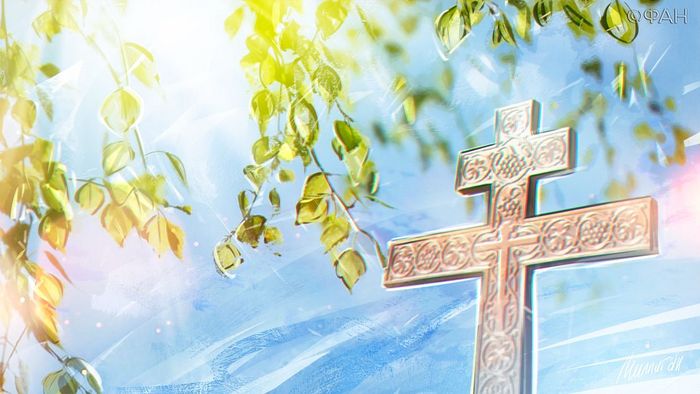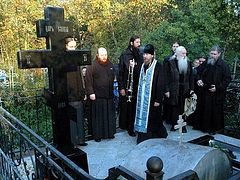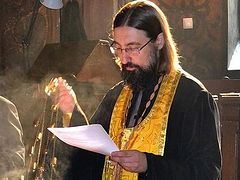Today’s Church-wide commemoration of the departed is known as Trinity Memorial Saturday. “Trinity”—because it occurs on the eve of the feast of the Holy Trinity, as we call the day of the New Testament Pentecost, in memory of the appearance in the world of the Third Person of the Holy Trinity—the Holy Spirit, descended upon the apostles in the Upper Room in Jerusalem in the form of tongues of fire.
The feast of Pentecost is also known as the Church’s birthday, because through the apostles, and then through the priesthood, the grace of the Holy Spirit has been poured out in the Mystery of Baptism on all members of the Church of Christ, including both those now living and departed Orthodox Christians. Therefore, the Church established the commemoration of the departed on the eve of the Pentecost event.
It is called “Memorial” because we come to church this day and commemorate, firstly, our dear departed relatives: parents and grandparents, and then all departed Orthodox Christians who have died a natural death or in an accident without having had time to prepare to depart to eternity, to partake of the Holy Mysteries of Christ: “Those who have departed this world of the elements of sea, wind, and fire,” as it says in the memorial prayer. On this day, we also commemorate soldiers who laid down their lives on the battlefield. Today we render to them our debt of love.
In Orthodoxy, there are no dead, for the Gospel says: For He is not a God of the dead, but of the living: for all live unto Him (Lk. 20:38). Therefore, it is very important to be prepared to move from this temporal life to eternity such that it would be eternal beatitude for us and not eternal death in the torments of hell. This depends on what we fill our hearts with today.
There is a very interesting example in the teachings of the Fathers. A man who was getting ready for a trip loaded his bag up with several sharp objects: nails, shards of glass, and other things. By the time he got there, they had cut the bag all up. So the human heart, filled with passions, will come to the threshold of eternity, all torn apart by them. Having created His Church, the merciful Lord gives each of us the grace of the Holy Spirit in the Mystery of Baptism, delivering the human soul from the violence of sin and the devil, helping it become free of the passions (cf. Jn. 8:32).
One day a hermit of the Caucasus Mountains living in Abkhazia, Fr. Konstantin, was asked about how to pass through the toll-houses. He replied that if we are not liberated from the passions in this life, they will follow us, hindering the soul from ascending to God. Fr. Konstantin made this comparison: Imagine that you really love some foods and that the very thought of them arouses your appetite. Similarly, the human soul is tested for various propensities while passing through the toll-houses by fallen spirits who present various passionate images to the soul. All of this is described in detail in the book of Blessed Theodora on the toll-houses.
Woe to the soul that is captivated by a passionate image and forgets the Creator. The holy fathers warn that our hearts should not cleave to anything earthly, because it is difficult to part with it, and even after death the soul will not have peace, having exchanged the Kingdom of Heaven for earthly, perishable goods. The apostle says: Of whom a man is overcome, of the same is he brought in bondage (2 Pt. 2:19). The Kingdom of God is inherited by those who submit themselves to Truth, but not by the slaves of corruption.
St. Macarius the Great says that a man who is truly seeking eternal life must be above all that exists in this world, transcend all earthly glory, and love only the Heavenly glory of Christ.
But certainly not everyone can lead such a high spiritual life because of human infirmity. Some have more determination for inner podvigs, some have less. And the holy Church established special days of commemoration of the departed, to help those who have departed for the other world with collective prayer; to cover what they could not or did not have time to do for the salvation of their souls during their earthly lives.
The apostle calls: Bear ye one another's burdens, and so fulfil the law of Christ (Gal. 6:2). We must fulfill these words not only in relation to the living, but also in relation to the departed. After all, temporary life and eternal life are like two communicating vessels. When we pour water into the one, it overflows into the other to the same level. Therefore, our prayers offered for the departed are a great blessing for them.
The days of commemoration of the departed are of great benefit for us as well, helping us acquire the remembrance of death, of which the Word of God says: In all thy works remember thy last end, and thou shalt never sin (Sir. 7:40). More than any other means, the remembrance of death teaches man responsibility for his actions, showing them in the light of eternal recompense.
Having the remembrance of death, we will compel ourselves to always act in an Orthodox way, whether there are any witnesses to our actions or not; because we know that our guardian angel is near us as well as the fallen demons, observing all our actions and words. Our guardian angels will try to justify us by presenting our good deeds committed in secret at the Judgment, and the demons will try to accuse us, presenting our sinful, shameful deeds.
Therefore, when we think: “I’ll do such-and-such; no one sees it anyways”—we cruelly deceive ourselves. Our conscience sees and knows everything, no matter how we try to choke it with plausible excuses for our unseemly actions. At the parting of the soul from the body, all these memories will come flooding back to us together with bitter regrets that we didn’t listen to the voice of our conscience, but it will be too late then. Let us try, dear brothers and sisters, to spend the days of our lives so we won’t be ashamed at the Last Judgment of Christ. Amen.




